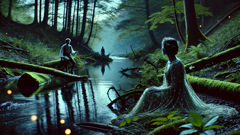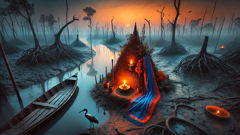Introduction
The Black Forest of southern Germany, dense and ancient, holds secrets in its mossy heart that have outlasted a hundred generations. Sunlight rarely touches the forest floor, and when it does, it splinters into a thousand beams through the thick canopy, illuminating carpets of ferns and wild violets. Legends grow like roots beneath these trees, whispered at hearths and carved into the memory of every child raised in the shadow of towering pines. Among these tales, none is more captivating—or more feared—than that of the Nixie. These water spirits, said to haunt the dark, glassy ponds and meandering streams, are as old as the rivers themselves. Some call them shapechangers, able to appear as beautiful maidens, silver-scaled fish, or even as a drifting mist that curls along the surface of a midnight lake. Their songs, it is said, can freeze a man’s heart or lure him to his doom. Yet for all the warnings, the allure of the Nixie persists. In villages nestled on the forest’s edge, stories abound of those who vanished on moonlit nights, of laughter echoing over water, and of wishes granted at a terrible price. To the outsider, such tales may sound fanciful, but to those who live beneath the ancient boughs, the Nixie is as real as the wind or the wild deer—an inescapable presence at the border between the known and the mysterious. It is in this world, in the creaking hush of a medieval dusk, that our story unfolds. A young woodcutter named Martin, restless and curious, finds himself drawn to the forbidden river bend where the Nixie is rumored to dwell. What begins as a search for truth will unravel into a journey through enchantment, peril, and the tangled ties between humankind and the wild heart of nature.
I. The Song Beneath the Surface
Martin had grown up beneath the long shadows of the Black Forest, his childhood a collage of woodsmoke, whittled toys, and stories shared under patched roofs while storms rattled the shingles. His father was a woodcutter, his mother a healer who understood every herb and root hidden in the loamy ground. He was seventeen when curiosity finally overtook caution, when the river’s silvery lure became impossible to resist. The villagers had always warned him—never go alone to the weir at dusk. The Nixie, they said, slips between the reeds and surface, her laughter mingling with the ripple of water. She might look like a beautiful maiden, pale as moonlight, her hair woven with water lilies and green rushes. But sometimes, she was just a flicker, a suggestion in the mist, or the sudden dart of a silver fish glinting between stones.

That evening, Martin carried his axe but also a charm: a sprig of St. John’s wort from his mother’s pouch. The path was soft with pine needles. Owls called overhead, and frogs trilled in the underbrush. When he reached the river bend, the air changed. It grew thick, almost syrupy with the scent of wet earth and distant rain. The water’s surface was so still it seemed not to flow at all, only to reflect the world in perfect silence. There, on the far bank, he saw her. Or rather, he saw something—a girl, perhaps his own age, seated with her toes trailing in the water. Her hair was the color of river pebbles, her dress shimmered as if woven from dewdrops. She sang, her voice carrying without words, and Martin felt each note tug at his bones, urging him closer.
He stepped onto the stones at the river’s edge. "Hello," he said, his voice barely a breath. The girl’s head turned, and her eyes—green as new leaves—fixed on him. For a moment, neither spoke. Then she smiled, but it was a smile that made Martin’s heart stutter, for it was both beautiful and impossibly sad. "Do you seek something?" she asked. Her voice was cool, a ripple on a summer night. "Or have you come to lose yourself?" Martin hesitated, remembering every tale of lost men, drowned cattle, and children who never returned from moonlit fishing trips. "I seek the truth," he managed. "They say you are real. That you are a Nixie." The girl’s laughter was like water over stones. "Truth is slippery here," she replied, "but you may find more than you wish."
The air grew thick again, and Martin felt his own reflection waver in the water. He tried to look away, but curiosity had its hooks in him now. "Do you have a name?" he asked. "Names are for those who stay," she said, "but you may call me Lorelei." The name sent a chill down his spine; it was an old name, older than the village, older perhaps than the river itself. "I won’t follow you into the water," Martin said, but Lorelei only smiled. "You already have."
His feet were wet. He looked down, startled—he’d stepped into the shallows without noticing. Panic fluttered in his chest, but Lorelei reached out a hand, and against all sense, Martin took it. Her skin was cold but not unpleasant, like a stone left in the shade. She pulled him forward, and suddenly the world shifted. The sky spun, the river bloomed with impossible colors, and the forest faded into a blur. Martin gasped. He was still standing on the bank, but everything felt different—brighter, sharper, as if he’d stepped into a dream.
"If you seek truth," Lorelei said, "look beneath the surface." She let go of his hand, and he watched as she slipped into the water, her form dissolving into silvery ripples. Martin knelt at the edge and peered into the depths. At first, he saw only his own reflection—wide-eyed and pale. But then shapes began to move below: flickers of light, tangled branches, the suggestion of faces twisted in longing or sorrow. The river was not just water. It was memory. It was hunger. It was the border between worlds.
Martin returned home that night changed. He barely spoke, lost in dreams of water and laughter. He tried to tell his mother what he’d seen, but she pressed a finger to his lips and handed him a bowl of broth scented with thyme and rue. "The river gives and takes," she whispered. "Best you remember that." But he couldn’t forget Lorelei’s eyes or the song that haunted his sleep. And somewhere deep inside, Martin knew he would return to the river’s edge—no matter the warnings, no matter the cost.
II. Bargains with Shadows
Days slipped by in a haze for Martin, who felt the river’s pull like a tide beneath his skin. He saw Lorelei again and again—sometimes as a girl, sometimes as a silver fish darting through reeds, once as a mist that curled around his ankles when he strayed too close to the water at dawn. The villagers noticed his distraction. Old Frau Gertrude muttered charms when he passed, and his friends whispered that Martin was touched by faerie. His father, worried, sent him on longer routes to fell trees far from the river’s edge. But even among the ancient firs and high mossy stones, Martin heard Lorelei’s song, a melody threaded with longing and sorrow.

One evening, as twilight fell and a thin fog snaked along the forest floor, Martin crept again to the river bend. Lorelei waited for him, more beautiful and sad than ever. “Why do you linger here?” he asked. “Isn’t there another world for you?” She gazed past him at the darkening woods. “This is my world and not,” she said softly. “Once, I was human. But I made a bargain—one I cannot undo.”
Curiosity overcame caution. “What bargain?” Martin pressed. Lorelei’s eyes shimmered with tears. “Long ago, a drought threatened my village. Our wells ran dry, and children grew weak. In desperation, I pleaded with the spirits of the water. They answered with a promise: life for my people, but I would belong to the river forever. I agreed.”
Her story settled between them like mist. Martin felt the ache of it—the sacrifice, the unending loneliness. “Can’t you be freed?” he asked. Lorelei shook her head. “Not unless another takes my place.”
A chill ran through Martin. He remembered every story his mother had whispered: the price of magic, the dangers of bargains struck in sorrow or love. Yet something in Lorelei’s gaze stirred his heart—a longing to help, to break the cycle of sacrifice. “Is there nothing else?” he asked desperately.
“Maybe,” Lorelei said, her voice barely a whisper. “If someone can see me for what I am—not a monster, not a spirit, but both—perhaps the curse can be eased.”
They sat together in silence as night deepened and stars blinked above the dark trees. The river gleamed like a path of silver glass, hiding secrets in its depths. Martin made a vow that night, quietly and without fanfare: he would not abandon Lorelei to her fate. He would find a way to help her, no matter what it cost.
The days that followed were filled with restless searching. Martin pored over his mother’s old herbals and sought out the oldest villagers for their wisdom. He learned of other Nixies—some cruel, some kind—of talismans made from rowan wood and songs sung backward at midnight. Each story offered a piece of the puzzle but never the whole.
One stormy night, Martin’s mother found him staring into the hearth flames. “You seek answers for someone who is neither living nor dead,” she said. “The river’s magic is older than any charm I know. But love can change what magic cannot.”
Martin carried these words with him as he returned to the river again and again. He began to see Lorelei not just as a trapped spirit but as a person with hopes, regrets, and dreams long denied. Their conversations deepened. She told him of her childhood—how she loved the scent of apple blossoms, how she once hoped to see the world beyond the Black Forest.
Together, they laughed, wept, and watched the moon’s reflection ripple on the water’s surface. Yet always, beneath the warmth, lingered a shadow—the knowledge that time was running out. The river grew restless as midsummer approached, its current quickening, its song darkening. One evening, as thunder rolled over the forest and rain fell in silver sheets, Lorelei appeared more ghost than girl. “The river demands its due,” she said. “If I stay much longer, it will claim me forever—and perhaps you as well.”
Martin’s heart ached with fear and defiance. “Then let me make a bargain,” he said boldly. “Let me share your fate—half in this world, half in yours.” Lorelei looked at him with wonder and sorrow. “That is not how such stories end,” she whispered. But Martin took her hand, and the river surged around them, shimmering with ancient power.
Lightning flashed above the trees. The wind howled through the branches, and the water rose, swirling with the faces of those lost to its depths. Yet Martin held fast, refusing to let go. For a moment, he glimpsed himself reflected in Lorelei’s eyes—changed, older, braver. The river hesitated, its hunger checked by something stronger than fear: compassion. The storm subsided, and Lorelei’s form flickered, growing more solid, more human. The river had taken its due in sorrow and longing, but it had never been offered love freely given.
As dawn broke over the misty forest, Lorelei stepped from the water onto solid ground. Her hair shone with the pale gold of morning, her eyes bright with hope and relief. Martin wept with joy. The Nixie was free—not by a trick or a bargain, but by the simple power of seeing and loving her as she truly was. They walked together from the riverbank, hand in hand, as the first birds sang and the world seemed new.
III. Echoes in the Water
With Lorelei freed from the river’s curse, life in the village seemed to shift subtly, as if a weight had been lifted from the air itself. The villagers noticed Martin’s change—his smile was quicker, his step lighter. He and Lorelei became a familiar sight, walking together through sun-dappled glades and along the banks where once only shadows lingered. Yet, neither forgot what had transpired beneath the surface. The river still flowed with secrets, and the memory of those who had vanished lingered in every eddy and current.

Lorelei had not lost all her magic. Sometimes, when she thought no one was watching, she would slip silently into the water, emerging moments later with wildflowers in her hair or drops of dew clinging to her skin in intricate patterns. Children followed her with laughter and awe, believing her to be a fairy godmother or wise woman sent by the forest itself. She used her gifts gently—healing sick animals, coaxing stubborn seeds to sprout, singing lullabies that soothed nightmares from even the most fretful child.
Martin, too, was changed by his encounters with magic. He learned to listen more closely to the world around him: the sigh of wind through branches, the hush before a summer storm, the subtle language of birds and beasts. He became a bridge between village and wild, trusted by both his kin and the creatures of the forest.
Yet peace is never simple or permanent. As autumn deepened and leaves turned to flame, a new unease crept through the woods. Fishermen found their nets tangled with strange silver hair; travelers spoke of seeing spectral figures at dusk; cattle grew restless at the sound of running water. Lorelei sensed it first—a disturbance in the river, a sadness heavier than her own former curse. One evening, as Martin sat carving a new flute by firelight, Lorelei appeared at his side, her face troubled. "There are others," she whispered. "Other Nixies still bound by sorrow and longing. I hear their voices calling."
Martin listened in silence. He remembered the faces that had flickered beneath the water during the storm—the lost souls, neither fully gone nor at peace. "Can they be freed as you were?" he asked. Lorelei shook her head slowly. "Perhaps. But their pain is deeper, their stories twisted by centuries of loss and misunderstanding." The task seemed impossible, but neither could turn away. Together they resolved to help—if not to free all the Nixies, then at least to ease their suffering.
They spent the next weeks traveling from stream to stream, learning each waterway’s peculiar moods and secrets. Sometimes they found nothing but silence and moonlit ripples. Other times, they encountered Nixies who appeared as children or old men or shimmering schools of fish. Some were wary, others angry, a few so desperate for company that they nearly pulled Martin into the depths out of sheer loneliness.
Lorelei sang to them all—songs of mourning, songs of hope, songs that remembered what it meant to be human. Martin offered gifts: flowers, honeycomb, stories from the world beyond the riverbank. Slowly, the waters grew calmer. Fishermen returned with full nets. Lost travelers found their way home. The forest itself seemed to breathe easier, its shadows less menacing.
But one night, as winter crept down from the mountains and frost rimmed every blade of grass, Lorelei disappeared. Martin searched for her along every river and pool, growing frantic as days passed with no sign. At last he found her at the oldest bend in the river, where water ran dark and deep beneath ancient willow trees. She stood knee-deep in the current, her face pale with exhaustion.
“They need me,” she said, her voice hollow. “Their sorrow is too great to bear alone.” Martin waded in after her, heedless of the cold. “You can’t save them all,” he pleaded. “But you don’t have to suffer alone either.” He wrapped her in his arms, and together they wept for the lost and the lonely—both human and spirit.
As dawn broke and frost melted from the willow branches, Lorelei smiled through her tears. “Thank you,” she whispered. “For seeing me. For staying.” Martin kissed her brow and helped her from the river. Together they walked home, stronger for what they had endured.
In time, Lorelei became legend herself—not just a Nixie of sorrow and doom, but a guardian spirit of hope and healing. Villagers left offerings at the riverbank each spring: garlands of flowers, loaves of honeyed bread, songs sung in gratitude for water’s gift. The boundary between human and spirit blurred, softened by compassion and understanding.
And so, though the Black Forest remained wild and mysterious, its waters still whispering ancient secrets beneath the mossy boughs, those who listened closely heard a different song—a song of love given freely, of burdens shared, and of hope rising like mist from the heart of the river.
Conclusion
Long after Martin and Lorelei’s story faded into legend, the people of the Black Forest kept their rituals alive. They honored the rivers not out of fear but with reverence for their life-giving power and the mysteries they held. The Nixie became a symbol not only of caution but also of compassion—a reminder that beneath every warning and every wild tale lies a deeper truth about our place in the world. Some who walked the shadowed paths at dusk claimed they still heard haunting songs drifting over still waters or caught glimpses of a silver-haired maiden laughing with a woodcutter beneath the willows. Whether these were spirits or simply memories living on in the land’s bones hardly mattered. The real magic, it seemed, was in seeing what lies beneath the surface: sorrow transformed by understanding, fear dissolved by love, and the wild heart of nature cherished rather than shunned. In every ripple of the river and every whispering pine, the legend of the Nixie endured—a timeless echo of hope and belonging at the edge of human knowing.













